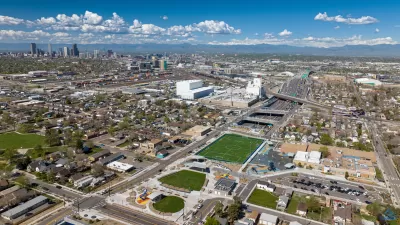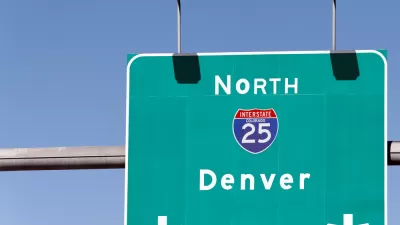The Central 70 Project is well underway in Denver, with a public-private partnership completing major changes to the interstate freeway where it cuts through the city.
Toll lanes are under construction and running tests along Interstate 70 in Denver as a component of the Central 70 Project, according to an article by Paolo Zialcita for Denverite.
The project calls for 10 miles of express lanes through central Denver in addition to the removal of a 57-year-old viaduct between Brighton and Colorado boulevards and the addition of a four-acre park, explains Zialcita.
The project is expected to cost $1.2 billion and wrap up by the end of 2022. Drivers can expect to see operation toll lanes at the beginning of 2023. In the meantime, “Tolls along the route will be waived during the test, and the group behind the work is encouraging drivers to take advantage of free access so it can identify problems,” reports Zialcita.
According to August 2021 coverage of the Central 70 Project by Nancy Kristoff for ENR Mountain States, the Central 70 Project represents a big bet on public-private partnerships. The Colorado Department of Transportation, the Colorado Transportation Investment Office, the Bridge and Tunnel Enterprise, and Kiewit Meridiam Partners are working together on the project.
Kristoff also provides a little more detail about the forthcoming freeway cap:
The project adds one new express toll lane in each direction and removes a 57-year-old, 1.8-mile-long viaduct, replacing it with a lowered highway that includes a 1,000-foot-long cap—a covered portion of the highway that will be the site of a four-acre park to help reconnect neighborhoods long divided by the freeway.
The Colorado Department of Transportation touts the benefits of the project in terms of congestion relief (a prediction that should be taken with a grain of salt), reduced noise impacts on surrounding neighborhoods, the replacement of structurally deficient sections of the freeway, and the reconnection of neighborhoods with the cap park. The project was controversial, however, for environmental and social reasons. Local organizations protested the project well after federal approval was granted the project, as detailed in Planetizen coverage in Spring 2017.
FULL STORY: I-70 in Central Denver will soon have express lanes in an attempt to manage congestion

Planetizen Federal Action Tracker
A weekly monitor of how Trump’s orders and actions are impacting planners and planning in America.

Map: Where Senate Republicans Want to Sell Your Public Lands
For public land advocates, the Senate Republicans’ proposal to sell millions of acres of public land in the West is “the biggest fight of their careers.”

Restaurant Patios Were a Pandemic Win — Why Were They so Hard to Keep?
Social distancing requirements and changes in travel patterns prompted cities to pilot new uses for street and sidewalk space. Then it got complicated.

Platform Pilsner: Vancouver Transit Agency Releases... a Beer?
TransLink will receive a portion of every sale of the four-pack.

Toronto Weighs Cheaper Transit, Parking Hikes for Major Events
Special event rates would take effect during large festivals, sports games and concerts to ‘discourage driving, manage congestion and free up space for transit.”

Berlin to Consider Car-Free Zone Larger Than Manhattan
The area bound by the 22-mile Ringbahn would still allow 12 uses of a private automobile per year per person, and several other exemptions.
Urban Design for Planners 1: Software Tools
This six-course series explores essential urban design concepts using open source software and equips planners with the tools they need to participate fully in the urban design process.
Planning for Universal Design
Learn the tools for implementing Universal Design in planning regulations.
Heyer Gruel & Associates PA
JM Goldson LLC
Custer County Colorado
City of Camden Redevelopment Agency
City of Astoria
Transportation Research & Education Center (TREC) at Portland State University
Camden Redevelopment Agency
City of Claremont
Municipality of Princeton (NJ)




























